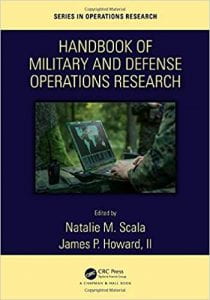Data-driven decision making is valued in business, but it becomes life-and-death when working in national security and defense.
 “There are different goals when working in defense. It becomes less about costs and more about the mission, which can include saving human lives,” said Natalie Scala, Ph.D., an associate professor of Business Analytics and Technology Management at Towson University.
“There are different goals when working in defense. It becomes less about costs and more about the mission, which can include saving human lives,” said Natalie Scala, Ph.D., an associate professor of Business Analytics and Technology Management at Towson University.
Before Scala joined academia, she spent several years working in the Department of Defense, where many around her had backgrounds in the military. She, on the other hand, was a civilian with degrees in industrial engineering and mathematics.
“Working in the DOD, I learned new ways to apply analytics that I hadn’t been exposed to in school. It was a new problem space for me,” Scala said.
Scala’s experience and observations inspired her research interests as a professor and recently motivated her decision to write her first book, Handbook of Military and Defense Operations Research, which was published by the CRC Press in February.
Scala co-edited the book with James Howard, Ph.D., a scientist at the Johns Hopkins Applied Physics Lab. The Handbook of Military and Defense Operations Research is compiled of papers by almost 40 different academics and practitioners.
“It’s about getting people to use the models, communicate with the client, and develop analytics that actually solve problems.”
“I appreciate that I was able to work with so many different authors. It was a chance to expand my network and showcase what people are doing at other universities,” said Scala. “I was able to reach out to communities in the academic field as well as practitioners – some at NATO – and catch up on the leading approaches and tools.”
The book offers tools and techniques that help transition a person from learning operations research and analytics in school to applying it in a new problem space – namely, defense. Or, it works vice-versa; the same tools and techniques could help a person who has experience in the military but may not have formal education in analytics.
“I hope readers take away the ability to work with complex analytics problems at a fundamental level,” said Howard. “This book should give analysts the background and familiarity they need to do their jobs better.”
For example, in the section dedicated to “Soft Skills and Client Relations,” there’s a chapter titled “Why Won’t They Use Our Model?” It covers how to ask the right questions in order to solve the right problems. Analysts need to work together with their clients, which can often be, problematically, over-shadowed by “hard skills.”
“It’s about getting people to use the models, communicate with the client, and develop analytics that actually solve problems,” said Scala. “That’s how you become a better practitioner.”
The Handbook of Military and Defense Operations Research is available on Amazon, where it was recently ranked as the number one new release in the Industrial Production and Management category.

